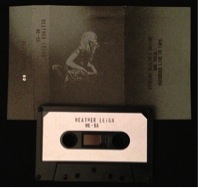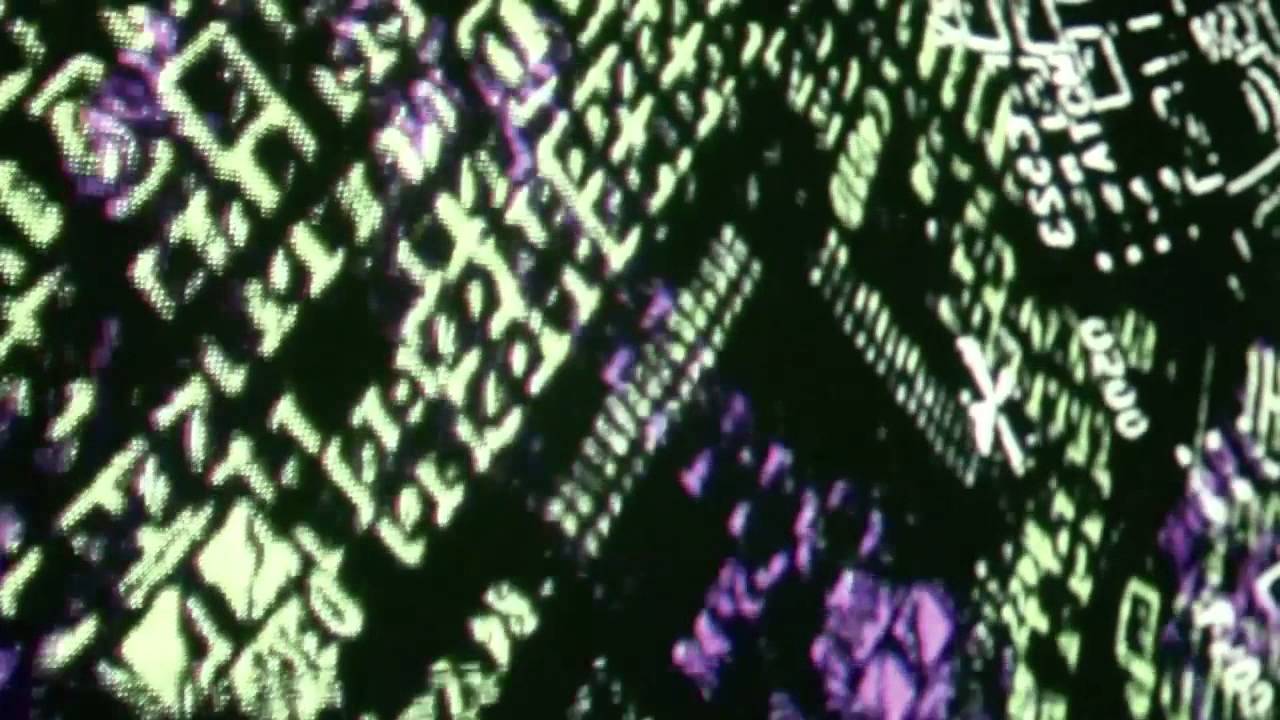This dirty dated realm of microscopic labels, home recordings and music-by-post is something of an idyllic simulacrum of the mainstream. Drawing lines on a map between the labels, sellers, artists and distributors in question, it’s possible to begin formulating something of an apolitical revision of the music industry’s map, a Gall-Peters projection of a culture that – despite all this ‘democratising’ technology we hold in our hands – chiefly remains little more than a clone of the 20th century music industry model, albeit with a slightly longer digital tail. In the thriving analogue parallel world, all roads can lead anywhere, with London, Berlin and New York no more important than Nottinghamshire or Glasgow. A noise duo from Maine send music to get pressed in Dublin, a Viennese label release sprawling epic drones from Ireland, and it’s still blessedly rare in the cassette-sphere to read those dreaded stale words: "since moving to Brooklyn". Without an ostensible centre stage, and diminishing barriers, we’re all part of it – there are no outsiders.
It’s a utopian imagined landscape, where respect and popularity are inversely proportional, and obscurity prized almost as much as success. From the look of things, 2014 could well be the proverbial ‘year of the cassette’ (in its modern iteration at least). For example, Faux Discx has already dropped one of the year’s first truly great tapes in the form of Housewives’ bold self-titled EP of revisionist no-wave which, as Simon Jay Catling points out in his Quietus review, not only thrives on tape, but may indeed be born from the clash between "maximal ambition versus minimal resources" which the format presents. Elsewhere the UK-based Opal Tapes’ entire catalogue has been trailblazing routes through the hierarchical house and techno scenes. Refreshingly abstract and restlessly prolific, as informed by cassette culture’s ‘anything goes’ remit, it impressively managed to make a name for itself in 2013, a year that saw the kindred likes of PAN and L.I.E.S. continue to dominate the busy cutthroat experimental electronic crossroads. As anybody who’s shopped for vinyl recently may have considered, perhaps it’s a matter of money.
Resident Advisor recently hosted one of their ever-so-slightly-too-cool exchanges discussing Berlin’s vinyl culture. Rife with insider DJ anecdotage, the panellists certainly knew what the hell they were talking about like no other could, and yet the group were still undoubtedly deluded. A cluster of cosmopolitan automaton audiophiles, for whom it’s nothing to drop a week’s earnings on vinyl, gathered in the German capital to discuss how brilliant vinyl stores are, not unlike the oblivious cast of DJs Complaining. Being immortalised in wax is certainly definitive for any musician, but getting dubbed on tape is cheap – and to the folks with a taste for new experimental music and limited funds, that stands for a lot. Vinyl prices are shooting up, with packages commonly breaking triple figures (that seventeen-disc Can box set looked nice, but anybody dropping £400 on a set that includes Rite Time and is easier to stream than South Park probably needs a reality check), and it’s all part of a familiar process of suffocating gentrification, something to which it seems tapes, that often most hated of formats, should be inherently immune. That having been said, US label Constellation Tatsu did release their Winter Batch this month, comprising three tapes along with a jar of infused honey. And yet this will still only put you back a mere $16 – comparative peanuts for three artworks and a little something to stir in to your breakfast porridge.
In other news, it’s unusual for any online columnist to receive even the slightest trace of a real response, yet the very first edition of Spool’s Out has already won immortal status in four minutes of an attempted slating on January’s episode of yankee tape music podcast, Tabs Out. (The guys were clearly not happy with the fact that both of our names confusingly contain the word "out".) For the uninitiated, Tabs Out is a monthly stateside podcast wherein three pizza boys meet up in their parents’ basements to play each other tapes. Luckily unburdened by girlfriends and stuck in Delaware with little else to do beyond surf Bandcamp, Tabs Out remains the best place to hear new experimental music put out on cassette – even if the dear chaps behind it lack the gumption to seek out the etymology of the word ‘limey’ and ironically fail to grasp the meaning of ‘wanker’. Fortunately, the fast-forward button (coincidentally pioneered by tape players) ensures it is still simplicity itself to cut straight to the music and basically ignore them musing on how awesome Chipotle is or whatever.
Now on to reviews, which this month include a couple of inclusions from John Doran.
Heather Leigh – Me-Ba
(Alice Zinc)

Solo electric guitar noise has had a pretty poor showing in recent years. Keiji Haino hasn’t done a solo guitar record since 2006, while Thurston Moore’s been wandering deeper into the cavernous wilds of freeform collaboration, and the Metal Machine Music originator himself checked out for the void. Heather Leigh Murray and Alan Licht – who co-shredded behind Jandek on Glasgow Sunday 2005, incidentally – have been keeping the form alive, with the latter dropping the fantastic Four Years Older on Editions Mego in April last year, and the former releasing Me-Ba in December. Fronted by a washed out monochromatic mid-performance portrait, it’s a certainly throwback to some of the aforementioned Haino’s infamous live freeform solos (most immediately Execration That Accepts To Acknowledge), albeit presented in unrelenting, up-close, straight-to-tape low fidelity.
Normally known for her pedal steel playing, Me-Ba sees Leigh switch to six-string and focus on feedback and distortion with almost no pause for respite. Throughout one can pick out near-themes and repeated moments of musicality amidst the blowout; seconds that could easily have formed the basis of a Dead C jam or launched out of some Fushitsusha monolith. Yet Leigh’s focus is purely on the ephemeral and leaves no time for themes to develop, choosing instead to chop them down and move to the next jarring blast of feedback or impulsively scraped string. It’s undoubtedly a harsh noise record, and something of a relief to finish, but Leigh’s enticing stream of consciousness freezes time throughout, leaving you little time to think or feel anything more than the squeals, clunks and non-sequiturs of her fretwork, and rendering Me-Ba inexplicably addictive for what is essentially self-flagellation.
Raising Holy Sparks – Era of Manifestations
(Feathered Coyote Records)
Perhaps it’s cheating to discuss an album released in October, but Era Of Manifestations is a sprawling double tape of epic enough proportions to require some months to simmer. Raising Holy Sparks is the brainchild of David Colohan, an Irish avant garde folky with a knack for drawn-out, acoustic-led drones in the vein of The Blithe Sons and Natural Snow Buildings, similarly littered with legitimate vocal ditties and all encased in field recordings to ensure the evocation of windswept natural drama. Guest players contribute plenty on Era, most vitally supplementing several jams with sax and gently jazzy percussion – reopening the dormant crossover between folk and free-jazz.
The interludes are rife with dark folk traditionalism, but it’s the sheer filmic breadth and latent beauty of the colossal drone pieces that underlines Era Of Manifestations. The twenty minute ‘The Great Bell On Dwelling House Rings, Calling Everyone Home’ takes up most of side A, amalgamating oceanic dulcimer notes and acoustic guitar fingerpicking with languid synth drones and a something of saxophone-led crescendo. Far from sentimental, this music chooses a rather subtler approach, characterised by the sort of shrewd compositional touch often missing from rambling drone music.
Soon Untitled
(Fort Evil Fruit)
The excellent Fort Evil Fruit label from Dublin have steadily fired out a varied selection of home-recorded compositions since 2012, but this untitled tape from Maine duo Soon may be the best to date. Naythen Wilson and Stephen Cicia craft a blend of industrial clatter, abstract noise and outsider folk that seems both wildly alien and oddly familiar in equal measure. Wolf Eyes’ more measured recent work is brought to mind, as are the signature atonal cryptic folk songs of Jandek, of whom Wilson released an entire cover album in 2012 on Fort Evil Fruit. Listening to this tape late at night will seriously scare the shit out of you, but not in a chainsaw-wielding, skin-wearing manner, more akin to the desolate solitude of Andrei Tarkovsky’s Stalker. Maniacal industrial hisses and whirrs hover in the middle ground, ebbing and flowing on the ten-minute ‘Rendered Doorless’ with the cold mechanic regularity of an offshore lighthouse submerged in fog, and occasionally threatening to disappear into the natural noise of the tape entirely. Far too fragile to simply call them songs, and too premeditated to leave resigned as ‘ambience’, Soon communicate using a hidden syntax. They discover suggestive musical threads in unforeseen places and throw ostensibly incongruent elements together to disturbing effect. Tarkovsky described his art as "born out of an ill-designed world", and quite the same can be said of this.
Imaginary Forces – Hominids
(Sleep Codes)
There are a few more of these horrible little boxes of ill sound available via the artist. I think side one is a field recording from the set of A Serbian Film from the P.O.H. of a cement mixer or the sound of the inhalation that the mother of the stillborn child makes in the closing 0.5 seconds of Threads time stretched out to 30 minutes. Side two sounds like the diegetic noise of New York’s underground system from Clive Barker’s Midnight Meat Train, but processed by Burial Hex. I don’t know why I’m talking about side one and side two – the black tape is unmarked, like the mass grave the rest of these cassettes should be buried in. I’m joking, of course – I really like it. So does my two-year-old son. It makes him do his screw face roadie dance. John Doran
Milk & Biscuits – Milk & Biscuits Tape
(Lick)
It’s easy to get engulfed amid the noise, drone and electronic discoveries that abound on tape these days. And so Milk & Biscuits’ self-titled tape EP certainly came as something of a sunny sonic relief during this month of overcast skies and long-form abstractions. The band have supported British Sea Power in addition to recording sessions on BBC 6Music, and oddly the label releasing this (Lick) is the ‘record label arm’ of the titular frozen yoghurt stand in Brighton. Now while alarm bells are probably going off from some of these words, the sunny disposition of Milk & Biscuits is not for scoffing. ‘Town & Country’ and ‘Rivers’ are both oozing with the sort of chugging, lightly psychedelic charm that keeps Yo La Tengo’s gentler moments from wearing thin. Perhaps this is the tender lethargic balladry Lou Barlow would’ve been making had he spent his time with the jolly staff of a frozen yoghurt shop instead of being bullied by J Mascis.
Lily – Modern Malaise
(No Corner)
Bristol’s relatively murky No Corner has put out some of the most exciting recent electronic music on tape since 2012. Last year saw killer sets from Federsen and Filter Dread released by the label, while Kahn & Neek’s Gorgon Grime tape from 2012 was a tribute to the duo’s love of early grime, fittingly embedded in a fog of FM-style tape hiss.
In this sense, Lily’s Modern Malaise is quite a departure, as it never hints at the UK underground, rather stemming from an imagined retrofuturist aesthetic with no real home besides sci-fi and videogame soundtracks. Littered with a handful of ambient interludes, and an extended prologue rife with Twin Peaks string sections and urban soundscapes, the beats abound across both sides of Modern Malaise, which plays like a mixtape lifted from the glovebox of Edward James Olmos’ Blade Runner spinner. Largely analogue synths and snatched polyglot vocal samples are woven together impeccably across this tape, with Lily electing for constant forward motion at a speed as ready for the dancefloor as it is for future Tron soundtracks. Steve Hauschildt attempted to capture a similar audio landscape on 2012’s Sequitur, yet while that album was weighed down by distinctly dull pop structures and a nagging flaccidity (presumably why the far more popular ambience of S/H was put together a year later), Modern Malaise dons the proverbial sci-fi costume with far more entertaining credibility.
The questing hangs in the air as to precisely who this ‘Lily’ is, and cryptic clues on the Modern Malaise page relating to William Gibson’s Neuromancer ("Cracks in the ICE") and No Corner’s historical association with Bristol’s Young Echo crew may well hint at the involvement of Vessel. (Vessel’s Seb Gainsborough has pulled the alias trick in the past with his Neuromancer-referencing house project, Panther Modern). In any case, this is a massively high quality debut tape.
My Panda Shall Fly – Higher
(Sonic Router)
Having taken his time finding his feet, Sri Lanka-born Suren Seneviratne has fully emerged with Higher. His debut Tape Tekkno LP was a somewhat muddied mix of hurried lo-fi techno, hinting at a cohesive voice but never revealing one amid eight tracks that, though the size and shape of an outsider techno release a la the divisive L.I.E.S. label, fell relatively flat on its face. Higher eases off the lo-fi side of things, instead focusing on Seneviratne’s adeptness for crafting downtempo, hip hop influenced grooves and milking colourful hooks. ‘Groupp Mind’ marries a chilled out keys line with stuttering FlyLo beats, and ‘Ark (Spirit Servant)’ hovers between latent house and the decaying drones of William Basinski. The decision to put his moody mug almost exclusively across the cover is perhaps a telling sign that Higher is My Panda Shall Fly’s real debut (or at least one he wants to be associated with).
Where Is This – Infinite Hum
(The Tapeworm)

Flat out noise is a tough review to write. The reasons as to why a particular twenty-minute stretch of luminescent white noise is any better than another are often actually relatively difficult to pinpoint beyond "that Masonna track made me feel dizzy, but in a good way", or "that Bastard Noise jam was a bit too much for me today". Rhythm, tonality and melody all go more or less out the window, leaving texture and structure behind. It is what it is, and the very being what it is, is most of what it is – if you get my meaning – and in this case, Where Is This is what it is.
The Tapeworm is a relentless tape label dedicated to putting out music by often-unknown artists aiming to explore the strengths, history and flaws of the format. They’ve already put out four tapes in 2014, including an abstract assemblage of iPhone recordings by Oren Ambarchi and, indeed, this ball aching blowout of a noise tape by Dubliner Mark Ward. Having pressed play, oppressive walls of distorted sound flood my speakers, the limits of the tape format readily audible, and any sense of clarity a distant memory already. There’s no detail given as to how the sounds were made either. This could be guitar feedback, or a distorted keyboard, or bastardised field recordings – and it barely matters. The very outer edges of the noise are perhaps softened somewhat by the cavernous reverb treatment given to the proceedings. This glacial edge is more audible on side two’s comparatively gentle ‘Infinite Hiss’, which chooses to lap the shore of the speakers in ebbing waves. But it’s the opening sidelong ‘Infinite Hum’ and the equally challenging high-end squall of ‘Infinite Howl’ that stick in the mind, giving and taking away in as much as it takes a stoic listener to make it through in one piece, but utterly defies any attempt at tuning out. The restlessly prolific DIY noise artist is almost an underground cliché at this point, but tapes like Infinite Hum are a reminder as to precisely why it’s such an important form of music, and just how the much sonic exploration we’ve still left to do.
Stephen O’Malley – TEMPESTARII + DISintegration
(Editions Mego)

Completing a trilogy of cassettes released on Austrian label Editions Mego, the overly capitalised TEMPESTARII + DISintegration is music composed by the Sunn O))) co-founder and all-round drone dude for a film and exhibition, seemingly set in Iceland, filmed in monochrome and aiming to be very slow and presumably surreal (see cover art) – but it’s of little consequence when spinning the tape. The trilogy in question (parts one and two were 2010’s Cocon & Oiseau De Nuit and 2011’s רומיאו) centres around structure and drone guitar, with this climactic edition marrying itself with field recordings of Icelandic coastline made by the filmmakers. Side one sees a single seamless guitar hum gradually overpowered over the course of eighteen minutes by increasingly powerful wave crashes, unmoving from its coldly aloof stance for most of the duration. Even when the waves give way to pillars of cosmic static ambience, that drone persists. Multitracked (or perhaps looped) strands of snail’s pace amp buggery gradually spiral together and onwards and upward, not so much with the cloaked menace of Sunn O))), but rather with the meditative and introverted intensity of an oil tanker’s hum.
The eighty-five minutes of music on this tape bring together the influences of several disparate fragments present in much of the music O’Malley’s either sponsored, released or played on since the last in his tape trilogy. Gravetemple’s Ambient/Ruin used field recordings to devastating effect (again, mostly the sound of water), Ákos Rózmann’s Images Of The Dream And Death – put out on O’Malley’s Ideologic Organ label – had similarly testing minimalism stretched to even longer lengths (it required three LPs), and KTL’s masterful fifth album investigated the affronting microtonal hum of Phill Niblock’s work. Epic durations, Niblockian meditations and a field recording-fuelled approach to structure conclusively merge on this tape. It’s typically mind-blowing music from O’Malley, and is perhaps his slowest work to date. It’s certainly his bleakest.
The Three O’Clock – Aquarius Andromeda
(Burger Records)

The Paisley Underground remains one of the least discussed moments in the history of US West Coast psychedelic rock. Only some fifteen years after the likes of The Byrds were rocking the same Californian towns with granny glasses and amped up folk tunes, the likes of The Three O’Clock revived the softer side of Californian psych, forgoing the expansive improvisations and hippie bullshit in favour of catchy tunes and John Hughes-friendly brevity. The subgenre was a playful, organic twist to the often cold, indifferent and synthetic aesthetic of 80s America, and The Three O’Clock were undoubtedly its leading light (elfin lead singer Michael Quercio purportedly came up with the term, ‘paisley underground’). This collection of rarities is both a fine revision and introduction to the band’s jangly pop songs and occasional humorous Frogs-esque diversions. For all the charm of their distinct tunes, however, the highlight is definitely the blistering cover of Syd Barrett’s eternally confounding ‘Lucifer Sam’, somehow brought with total conviction from swingin’ London kicking and screaming into the sonic territory of Ferris Beuller’s Day Off.
Signor Benedick The Moor – sbthemoor
(Deathbomb Arc)
The deluge of Bandcamp-based rappers are foolishly drowning each other out, although it does mean that those who make it through the baptism of fire required to pique even marginal interest are resultantly almost uniformly worthy of the attention. By any count, 20 year old Californian Signor Benedick The Moor most certainly is. This tape arrives only a few months after September’s full length El Negro, a richly varied piece of so-tagged ‘krautrap’ that incorporated live guitar and drums alongside MIDI orchestras to back up SIgnor Benedick’s outsider raps, name checking Cthulhu and referencing Much Ado About Nothing in the process. sbthemoor continues the haphazard lo-fi blend of influences from Signor Benedick’s mixed heritage, spending as much time on out-and-out orchestral rap as he does on gentle guitar instrumentals, up-tempo psych-hop floor fillers and hardcore punk riffage. The tape’s an uncategorisable, genre-jumping trip, woven at home with impeccable detail and instant likeability. Signor Benedick The Moor’s most definitely got even greater things yet to come.
Closed Circuits – .156
(self released)
Essentially the nom de plume of Chris Page, Closed Circuits brings together vague touches of industrial music with sparse, outsider songwriting anchored on Page’s dark baritone. His voice has something of the wicked storyteller in Nick Cave and the tortured romantic Michael Gira, but only gradually gets placed centre stage to dominate the album. .156 opens with a trio of interludes, where distant rhythms play out behind organ hum, white noise and inaudible whispers. The fourth track and centrepiece, ‘Sirens’ sees Page’s most Caveian delivery over unaccompanied, languid and distorted drum patterns – "I head the sirens at the crossroads / saw lights flickering through the trees…". The bass register gets filled out, piano lines weave in to the mix, and the pace picks up towards the conclusion in one of the finest turns of fuzzy madman pop in memory. After the piano balladeering of epilogue, ‘Possessions’, .156 truly lingers. A brilliant measured cry of post-industrial song smithery. Closed Circuits are playing their last London gig for a while this February, with Imaginary Forces and Liberez. Any who can are strongly encouraged to attend.
Nighthammer – Neu X
(Tesla Tapes)
I like a lot of stuff on Tesla Tapes, the magnetically coated, spooled, charcoal-coloured plastic strip arm of the GNOD empire, based up in Salford, Greater Gnodchester. Black Tempest’s Arcana, for example, is the kind of creaking and monolithic hardware (acid) house that Deep Thought, the megacomputer from Douglas Adams’ Hitchhiker’s Guide To The Galaxy would have listened to after answering the question to the life, the universe and everything, during a post riddle defragging. (The answer to the question by the way was "42" – the length of this cassette. A coincidence? Well, yes, probably.) And Trank Gun by Run Dust sounds like some hellish live recording of Regis, Speedy J and Mescalinum United. But Neu X by Nighthammer really does it for me. It’s a solo excursion by Tony Mountford, one half of the Noisestar label, responsible for putting out records by DRMCNT (including Quietus office anthem ‘Fishlicker’ a few years back) and $hit & $hine. This is ecstatic, pulsating techno that finds gloriously expansive, Vangelis-informed ground between Robert Hood and Underworld’s ‘Dark & Long’, and is ideal for the train ride early on the evening before the morning after, or the bus ride the morning after the night before.




